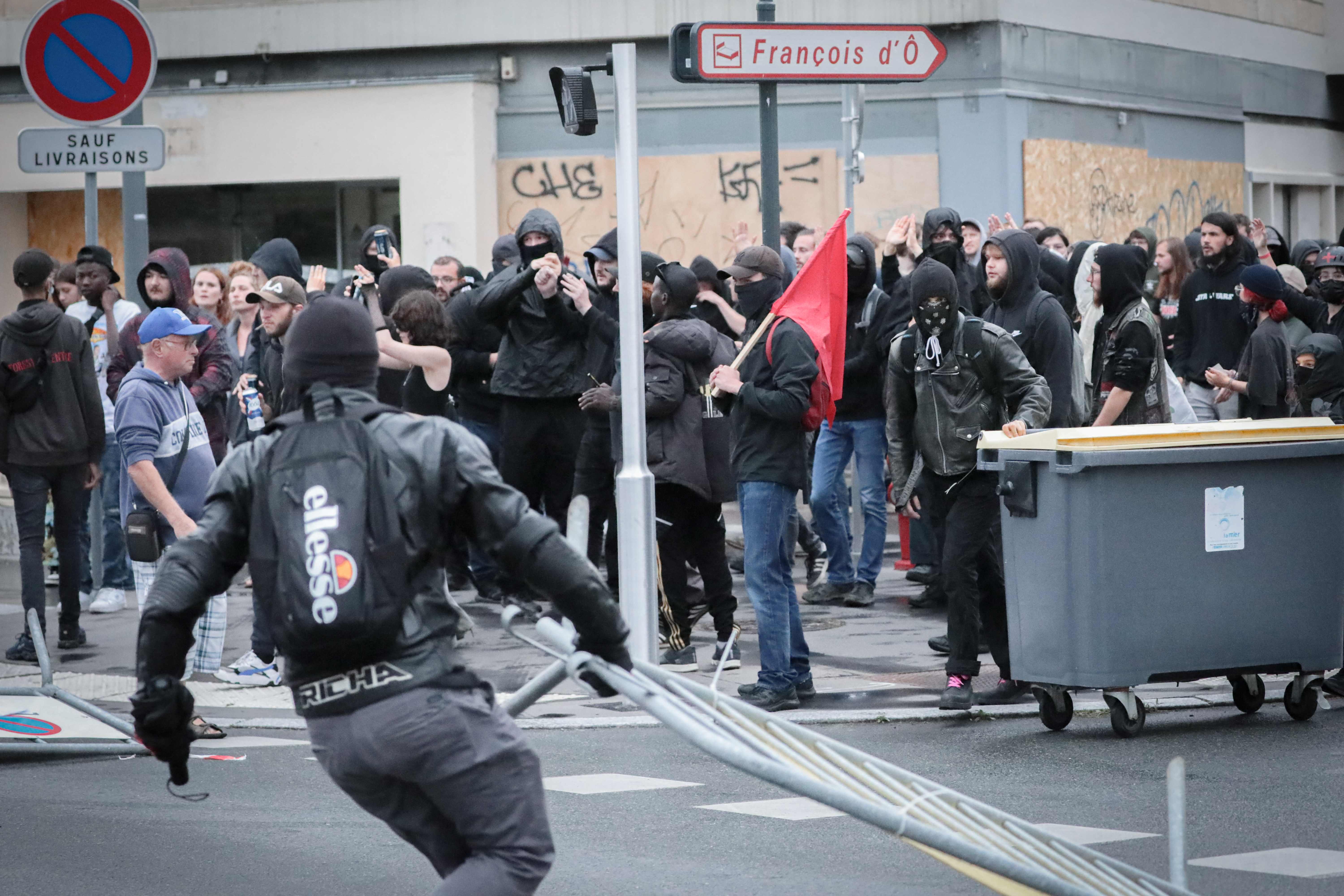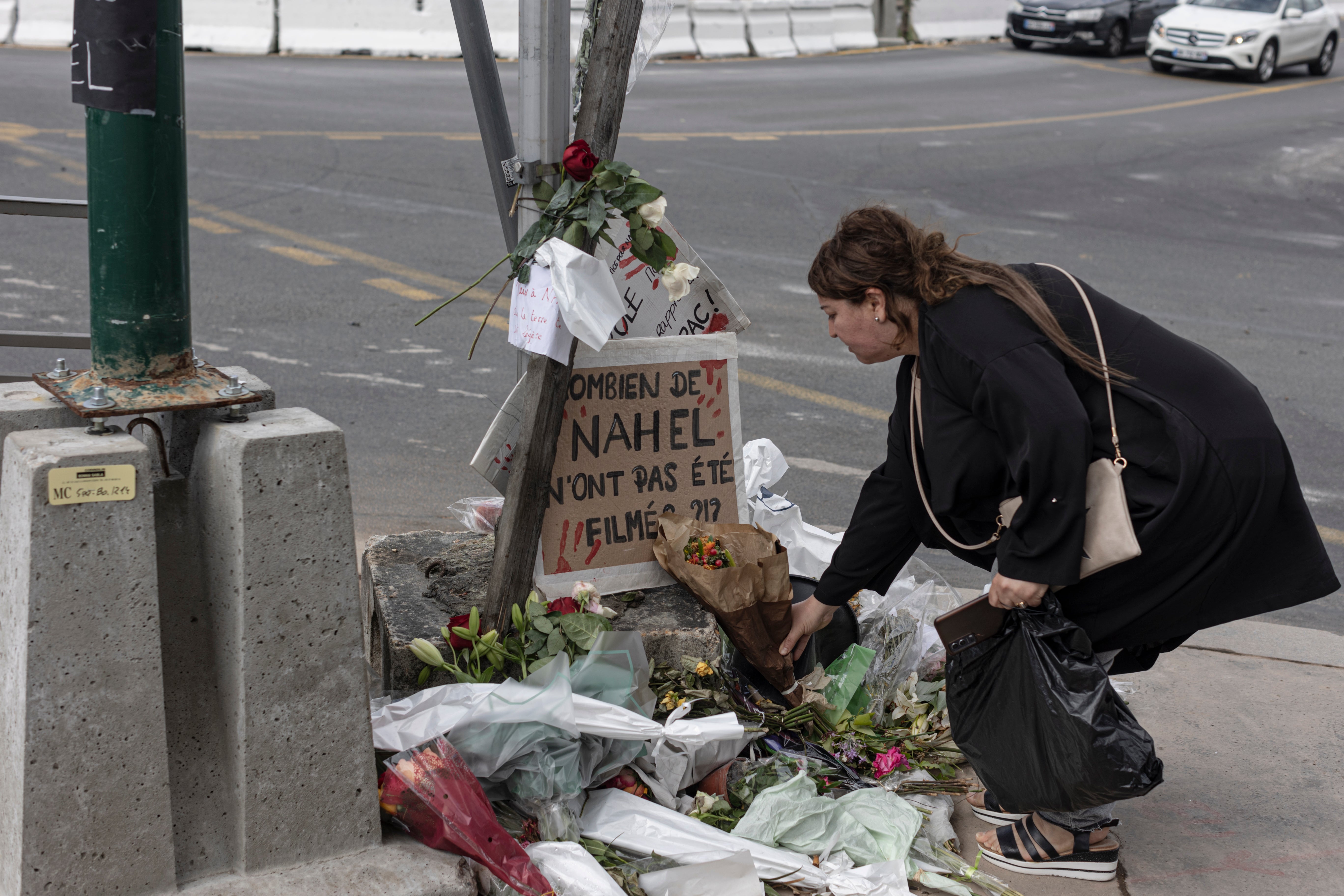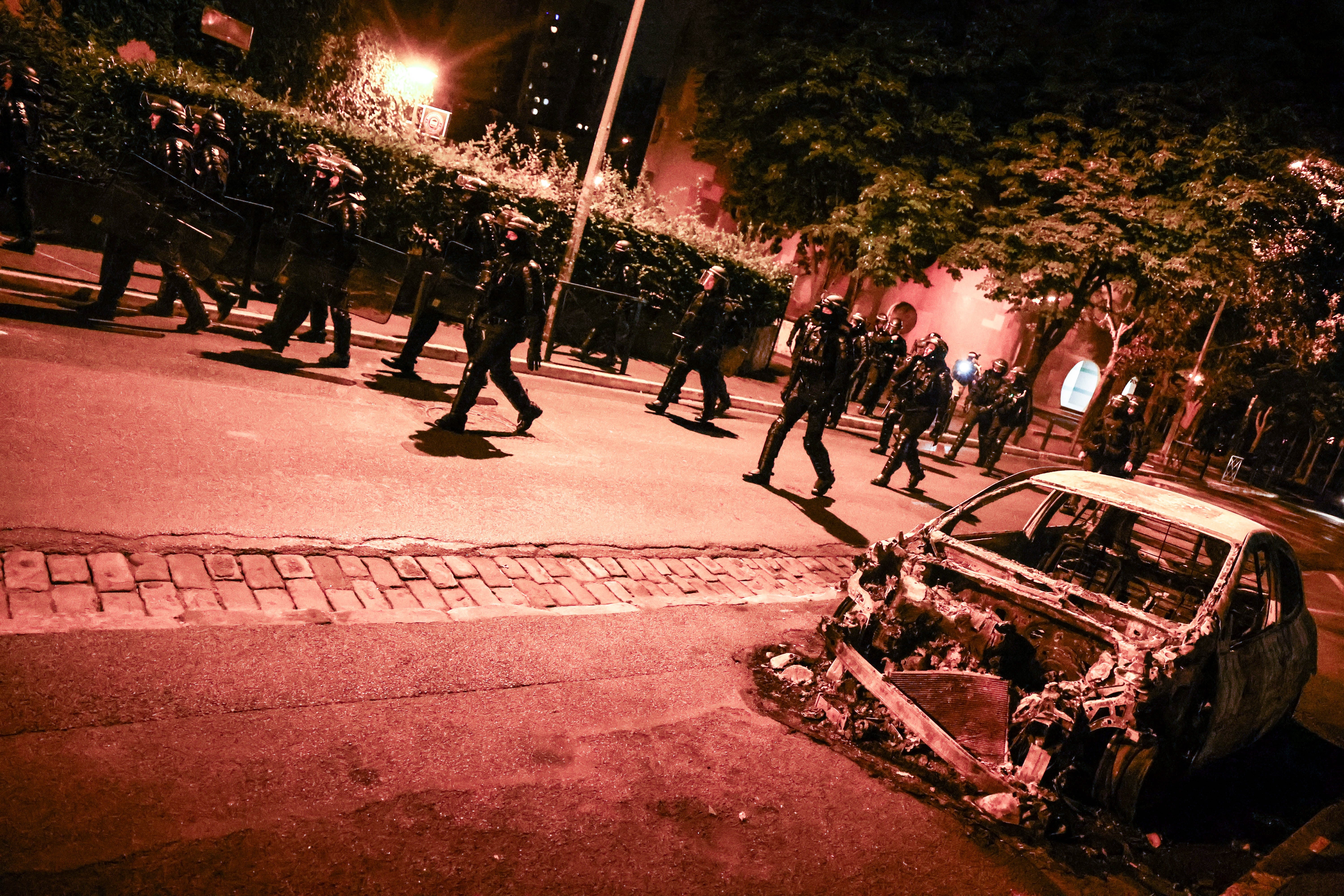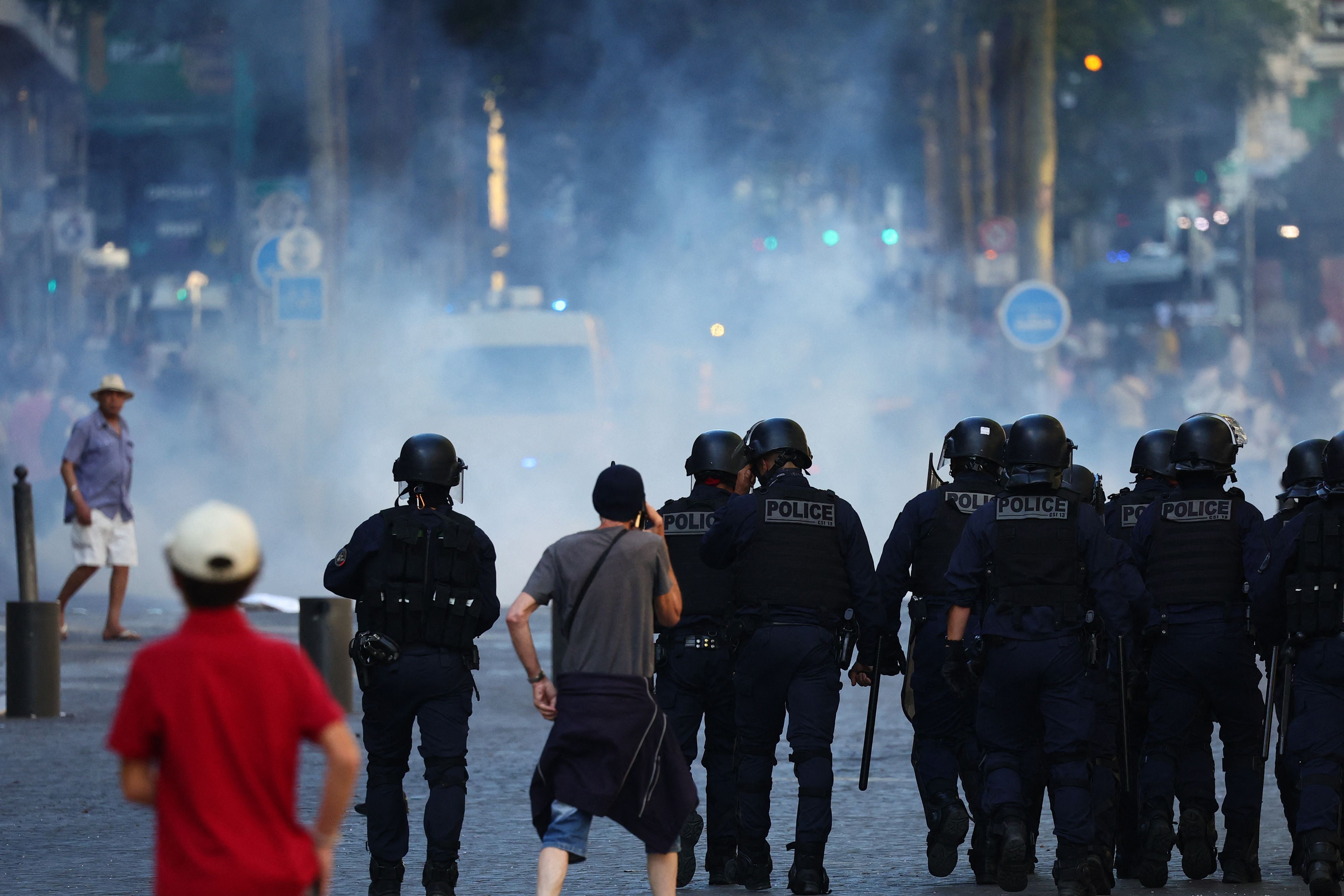Outrage and agony at funeral of boy whose ‘execution’ set France alight
As Nahel’s coffin was lowered into the ground, his mother bravely declared: ‘It is finished.’ But Bel Trew is told the country’s reckoning with racism and nights of rioting are only just beginning
Your support helps us to tell the story
From reproductive rights to climate change to Big Tech, The Independent is on the ground when the story is developing. Whether it's investigating the financials of Elon Musk's pro-Trump PAC or producing our latest documentary, 'The A Word', which shines a light on the American women fighting for reproductive rights, we know how important it is to parse out the facts from the messaging.
At such a critical moment in US history, we need reporters on the ground. Your donation allows us to keep sending journalists to speak to both sides of the story.
The Independent is trusted by Americans across the entire political spectrum. And unlike many other quality news outlets, we choose not to lock Americans out of our reporting and analysis with paywalls. We believe quality journalism should be available to everyone, paid for by those who can afford it.
Your support makes all the difference.The number of mourners was so large, crowds spilled out of the Parisian mosque and stopped traffic as they prayed in the middle of the street.
The killing of 17-year-old Nahel Marzouk by the police has been labelled an “execution” and has ignited the fury of the nation, sparking a level of unrest not seen in France for over a decade.
At least 2,400 people have been arrested across the country, curfews imposed and public transport curtailed as open street battles raged between protesters and police, and looting became rampant.
In response, President Emmanuel Macron deployed 45,000 officers, including elite anti-terrorism units and armoured vehicles which scour the streets.
But on Saturday, at Nahel’s funeral at a mosque in Nanterre, the west Paris suburb where he lived and was fatally shot, the most glaring absence was the security forces.
Volunteers from the local community instead curtly policed the streets, which are scrawled with the phrase “the country of police impunity”.
They reined in the emotions, which ran high when the body was brought out to a hearse escorted by hundreds of people on foot and on scooters.
“It is finished,” Nahel mother Mounia said bravely, in a cloud of female well-wishers after the coffin was lowered into the earth. “He has gone to paradise.”
Nahel – a teenager of Moroccan and Algerian origin – was shot by a police officer during a traffic stop on Tuesday: an incident which was caught on mobile phone footage, and showed Nahel driving away from the officers before one fired at him.
Outraged at the murder, and the apparent efforts by the police to paint Nahel as a troubled teenager wanted by the law, thousands have protested across the country.

Nahel’s death was “the last drop to cause the vase to overflow”, family friends repeatedly told The Independent. France exploded.
For four nights the streets of cities including Paris, Marseille, Lyon, Toulouse, Strasbourg and Lille have been ablaze with looters ransacking dozens of shops and torching 2000 vehicles according to the interior ministry.
There have been calls for calm and for President Macron to impose a state of emergency, with more unrest on the horizon.
The United Nations has also weighed in urging the country to “seriously address the deep issues of racism and discrimination in law enforcement”.
It has taken a toll on Mr Macron’s diplomatic profile. On Saturday Mr Macron was forced to postpone what would have been the first state visit by a French president to Germany in 23 years, citing internal security issues.

In the funeral march to the hill-top cemetery friends of the family said they were in “deep shock” and talked of struggling with racism endemic in the French police force.
“I’m shaken, we all are, especially as a mother with children living in this neighbourhood,” said Theresa, 60, who lived next door to Nahel’s grandmother and personally knew the teenager, she described as “smiley, hardworking and kind”.
“Thank god there is a video, the police are lying all the time. This might change things,” she added.
Mohamed, 60, who is also part of the Algerian community in Nanterre and a friend of Nahel’s mother Mounia, said they were all treated like “second-class citizens”.
“Nahel was his mother’s entire world, and now he is gone. She has lost everything. We simply do not get the same rights.”
Nahel was his mother’s entire world, and now he is gone. We do not get the same rights
His comments were echoed by half-a-dozen other mourners The Independent spoke to throughout the day.
“If you are not white, you’re not equal. There is a two-tiered nationality system,” said Abdelmalek Hamchoui, 62, a local community leader.
“I’m made to feel like I’m only French on paper,” added Hadhrami Belhachemi, 35.
And so the incident has thrown a searing spotlight onto France’s judicial and legal system.
Abdelmadjid Benamara, one of the family’s lawyers who is also from Nanterre, called Nahel’s killing an “execution” and told The Independent it was just the latest in a long line of alarming incidents committed by the French police.
He called for a slew of investigations into police response to the incident and for major reforms to the legal system.
You have to call a spade a spade: this is an execution
“You can’t be hypocritical about it. When a policeman kills a young teenager you have to call a spade a spade: this is an execution. You have to open the correct investigation,” he added.
While the police officer who fired the shot was taken in custody on charges of voluntary homicide when a video of the incident emerged, the second police officer on the scene has not been charged and is still working, Mr Benamara continued.
“The problem is with the legal system as a whole after a 2017 bill relaxed the rules around police officers' rights to use their firearms.”
“In 2022 there were 13 instances where the French police fired on citizens, in similar circumstances to Nahel M’s killing. Of those only five are being investigated” he added.

The only difference this time is that there is a video of the event.
“There is a social contract between the people and the government that has been broken. There is no trust any more,” he added.
The unrest has also revived memories of riots in 2005 that rocked France for three weeks and forced then-president Jacques Chirac to declare a state of emergency.
That wave of violence erupted in the Paris suburb of Clichy-sous-Bois and spread across the country following the death of two young men who ended up being electrocuted in a power substation as they hid from police.
Many people The Independent spoke to said nothing had changed since then.
“I’ve been living in this neighbourhood for 27 years, and it has only got more racist every year,” Laslah Baghdad, 58, another mourner from Nanterre said back at Nahel’s funeral.

“How you fight that I don’t know .”
The explosion of rage across the country, triggered by the video evidence of Nahel’s killing that points to homocide, might be the catalyst for a different future, Theresa continued.
“We have an expression: 100 years for the thief, a year for the master. This really embodies the situation here,” she said.
“But now we feel change will happen.”






Join our commenting forum
Join thought-provoking conversations, follow other Independent readers and see their replies
Comments